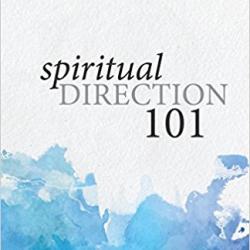 All spiritual directors need to be in a supervision relationship. If you are doing regular spiritual direction with anyone, you need to meet on a periodic basis with an experienced spiritual director who can assist you in taking a look at what goes on inside of you as you do this work.
All spiritual directors need to be in a supervision relationship. If you are doing regular spiritual direction with anyone, you need to meet on a periodic basis with an experienced spiritual director who can assist you in taking a look at what goes on inside of you as you do this work.
This supervisor should be someone other than your current spiritual director or therapist. He or she may have special training in supervision (some spiritual direction training programs incorporate it into their studies and other programs are specifically designed to train supervisors) or you may choose a wise and experienced spiritual director from your circle of colleagues who can read up on the basics of supervision and follow certain guidelines. It less important that the person have special training than that the person have a basic understanding of what you need.
Supervision is about support, guidance and assistance in helping you explore times when those “tender buttons” in your soul get pushed during spiritual direction sessions. Here’s an example of what we mean. Let’s say you are a divorced woman who experienced spousal abuse when you were married. You work with a directee who you believe is allowing her husband to verbally abuse her, and as you hear her tell her story, you become agitated and confused—unclear about how to proceed in the session due to your inner turmoil. Rather than allowing yourself to be carried away by your confusing feelings and lapsing into “fixing mode,” a wise director will put aside her inner turmoil for the time being and take those feelings into supervision.
Ordinarily in supervision, the director writes up a short case study with a one-page-or-less verbatim rundown of the conversation in which the heightened feelings occurred. Then, the supervisor will help the director explore what happened right as the confusing feelings erupted. The supervision session is not about the directee’s situation but about how the director felt about what he or she was hearing at the time.
After all those inner feelings are explored, the supervisor may spend a little time with the director considering “how to” tips for situations like that in the future.
As directors, we want to be fully who we are when we are working with directees, without being derailed by our own wounds, anxieties or worries. Supervision is how we conquer those blocks. And it is the best continuing education we can receive.
In this post, I have only focused on one-on-one supervision. There are ways to do peer supervision in groups. Both can be beneficial, although because issues of confidentiality are so important in supervision, my preference is always for the one-on-one version. It can be helpful to try both out and see what works best for your continuing education.
For more on supervision, I recommend these books:
Looking Into the Well by Maureen Conroy
Supervision of Spiritual Directors: Engaging in Holy Mystery by Mary Rose Bumpus and Rebecca Langer, eds.
For more about spiritual direction as I practice it, check out my website. If you have questions or comments about the content of Spiritual Direction 101, please let me hear from you in the reply section below.













